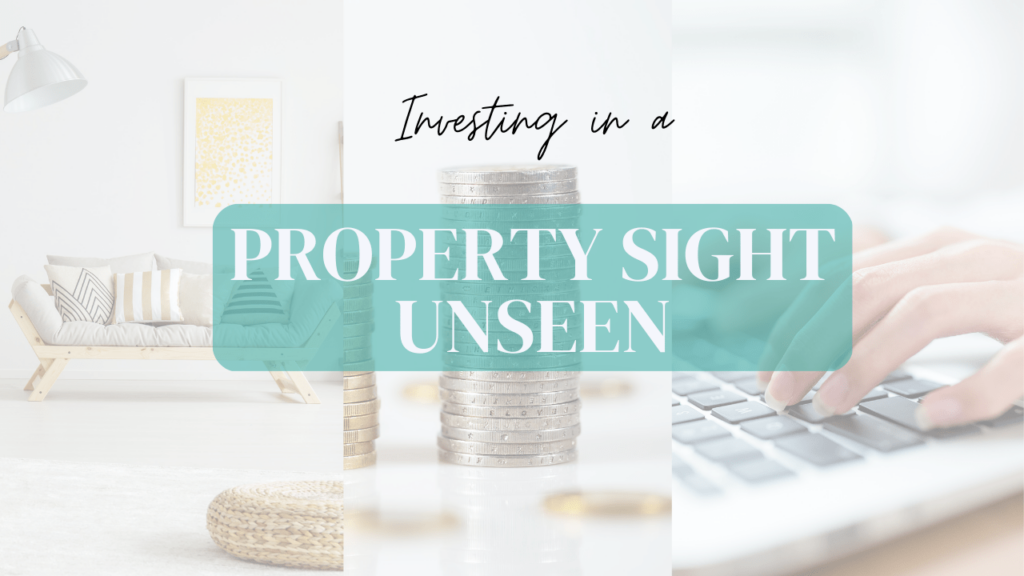
Thanks to exceptional technology, it’s easier than ever to invest in a property without seeing it first. You can take video tours, study detailed photographs and descriptions, and analyze maintenance and inspection reports to get an idea of what the property has to offer. There’s also a lot of access online to neighborhood information. It’s easy enough to understand what the local school districts look like and whether a particular property is close to shopping, restaurants, highways, parks, and entertainment.
As long as you have good technology and a team of local resources who can facilitate the sale, leasing, and management of your property, you can buy a property sight unseen.
There are a few extra risks involved in this type of real estate transaction, however. You’ll need to prepare yourself for minor frustrations along the way, and you’ll really have to invest some time and resources into developing local experts. You’ll need a local real estate agent, property manager, lender, as well as maintenance personnel.
Investing remotely is pretty common. If you’re planning to buy a property without seeing it first, here is what you need to know.
Partner with a Fantastic Local Real Estate Agent
Look for a local real estate agent who has experience working with investors from outside the area. This will help you move through the process with more efficiency and less frustration. You want your real estate agent to understand your investment goals, your timeline, and your budget.
While it’s possible to buy a home without a real estate agent, buying a property sight unseen really requires the expertise and the logistical support that an agent can provide. You need a set of eyes and a pair of hands. Here’s what you should look for in your real estate partner when you’re investing in a property that you don’t plan to see yourself:
- Market knowledge is probably the single most important factor. Your agent needs to talk with you about your price range and the priorities you have for the property. You’ll need an agent who has a good understanding about the various neighborhoods and communities where properties are listed. Look for information about schools, demographics, the local economy, and quality of life.
- Negotiation skills will be extremely important because you won’t be there physically to make offers and review counter offers. You’ll count on your agent to communicate with sellers and their agents. For example, if your agent recommends paying a price that’s higher than you expected, you’ll need to trust that the higher price makes sense because it’s a move-in ready property that won’t require a lot of work. You need an advocate.
- Look for credentials and experience. You need a good communicator who will keep you feeling like you’re right there, even when you’re many miles away.
With the right real estate partner, you’ll have a local expert who can show you some good options based on your investment needs and your budget.
You’ll Need a Local Property Manager, Too
If you have a real estate agent acting as your representative locally, why do you need a property manager so early in the investment process?
A property manager has a different set of skills than your agent, and a lot of experience in the rental market. With a property manager working on your team, you will have someone who can tell you:
- How much rent a particular property is likely to earn.
- Whether a lot of work will be needed before the property is ready for the rental market.
- How long of a vacancy period you can anticipate.
- What you’re likely to spend on routine, emergency, and preventative maintenance going forward.
Property managers can complement your real estate agent, and when you bring in a management professional early, you will have someone who knows your property. There will be less time between closing the deal and getting the rental home on the market.
Start With a Virtual Tour
It’s easy to feel like you’re seeing a property without actually being there, physically. Virtual tours are easy to record and share, and you can take your time looking at each frame and each element of the property that’s important to you.
Plus, you get to avoid that in-person tour or open house, which can often feel like a hard sell.
Always look beyond the produced tour, however. Ask your real estate agent or another trusted professional partner to visit the property for a showing. They can get you on a video chat, a FaceTime call, or some other video messaging platform so you can walk through the property with them. This will allow you to stop and focus on specific areas. You can step inside each closet and test every faucet, even if you’re not actually there.
A virtual tour can be an effective way to get a visual on your new investment property. You’ll still want to have a complete inspection done. You can’t see any potential mold from a video tour. You can’t tell if the floor is uneven or if the backyard tends to flood in the rain.
Get a live look at the property during various times of the day and night so you know what you’re working with. You can buy a property sight unseen, but you want to see it virtually, and you want to see it more than once.
Invest in a Property Inspection
Sometimes, waving an inspection is the competitive leverage you need to have your offer accepted by a seller quickly.
Don’t do this when you’re buying a property sight unseen, however.
A comprehensive property inspection is fundamental when you decide to purchase real estate that you have never seen and will likely never visit. You’ll want to know about any potential problems, especially when we’re talking about an investment property that you’re required to keep habitable and safe.
Home inspections will save you money in the long term and protect you against buying a property that won’t make a good rental. You can’t rent out a home with structural issues. You cannot lease space in a commercial building when it’s not up to code.
During the inspection, take a special look at:
- Structure and foundation. This includes the roof, the basement, the walls, floors, and frames. If there are any outbuildings like garages or sheds, you want those inspected, too.
- Electrical. The wiring needs to be safe and modern. Outdated wiring is often a problem in older homes. Do all the outlets work? If there are problems, make sure they can be easily fixed.
- Water damage. Water can have a serious impact on a property, and if there are leaks or signs of water intrusion, it could be due to plumbing problems or poor construction.
Review the inspection report carefully, and talk about it with your real estate agent and property manager. If the inspection unveils extensive damage, a price adjustment might be in order, or you may want to look elsewhere.
Make Your Offer
 Making an offer without the benefit of seeing the property yourself might seem risky. It’s actually not risky at all. You’ve gathered all of the information you would have gathered if you were there in person, and you have also enlisted the help of a real estate agent and property manager who have provided their expert advice. You’ll know you’ve identified a good investment property.
Making an offer without the benefit of seeing the property yourself might seem risky. It’s actually not risky at all. You’ve gathered all of the information you would have gathered if you were there in person, and you have also enlisted the help of a real estate agent and property manager who have provided their expert advice. You’ll know you’ve identified a good investment property.
There’s a lot of talk about the market cooling, and maybe it is. But, in metro Washington, D.C. and throughout markets like Baltimore, northern Virginia and Maryland, the real estate market is always competitive. It moves quickly. Make your offer sight unseen with confidence.
There may be a counter-offer, negotiations, and a lot of back and forth. As an investor from out of the area, you’ll likely be in constant touch with your real estate agent during this period. It can feel nerve-wracking when you’re not there, but trust the process and your partners.
The closing process can go forth without you there in person. In some cases, an e-closing can take place, through a secure online portal.
The ability to invest in properties and make offers even without seeing the space opens up a lot of doors for investors. You can cast a wider net when you’re looking for new markets to invest in, and you can take some steps to diversify your portfolio by investing in properties you may not have considered earlier.
This might have been uncommon at one point, but it’s not anymore. As long as you’re working with some expert local partners and you’re willing to invest some time into virtual tours and digital communications, you can buy a property sight unseen with relative ease.
If you’re thinking about investing in a property but you have no plans to come to the area, we’d be happy to work with you on this. Please contact us at Stripe Management. We work with owners, investors, and both residential and commercial properties in Prince George’s County, Montgomery County, Washington, D.C., and anywhere in the DC metro area.
